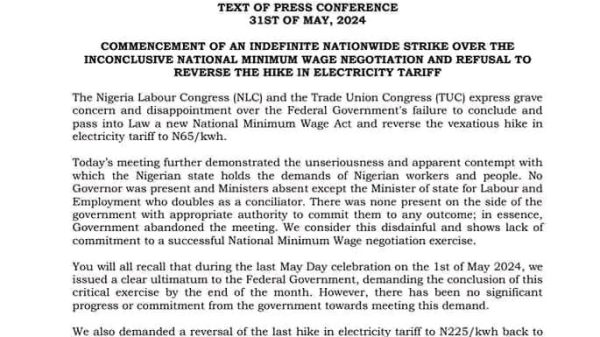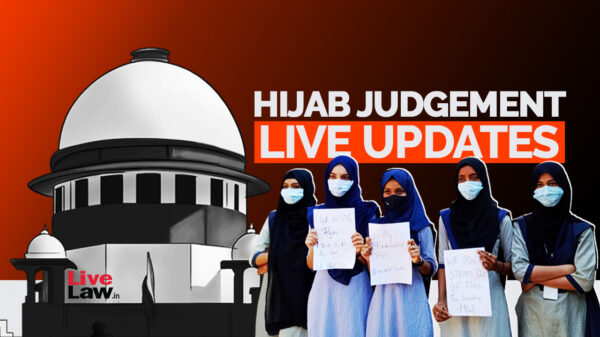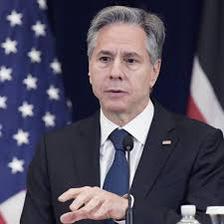Ministerial Synergies Via SGF (1)
By Ussiju Medaner
(Published In The Peoples Daily Newspaper, Wednesdays Column, 23rd, August, 2023)
Nigeria needs a total cleanup; a complete system overhaul that in-builds efficiency, effectiveness and accountability into a reawakened national life and in the implementation of its socio-economic policies. The Renewed Hope would be ‘business as usual’ except we meant business unlike other times and do things differently from other times. The only reason why a blessed nation such as ours is on its knees gasping for survival is the refusal of the country’s decades-long leadership to grasp the main challenges facing the country and take the right resolute steps in addressing them. Rather, we have government after government playing to the gallery; administering trial and error techniques, at best, and on many occasions, unworkable solutions to addressing real life and often pressing problems of the country.
There was a time when Nigeria was self-sufficient in food production and had a strong industrialisation drive. What were we doing then, and what do we need to do to return to these productive states of affairs? These and many more are the questions the national and statewide leaderships should be asking and setting up pieces of machinery to proffer solutions accordingly. At this point, we need to realise that our challenge is not about appointing ministers or state commissioners, but about getting people who know what our problems are and are truly challenged to occupy positions of authority to resolve them.
It is about time we know what our problems are, and be truly ready to face them resolutely. Currently, as much as there is hunger in the country coming apparently from the consequences of subsidy removal, the solution cannot be in the form of all the proposed palliatives that seek to directly distribute cash or food items to the citizens. How much would be enough to ameliorate the hardship the citizens are currently facing? Would a regular twenty thousand do in this era of unprecedented inflation? Definitely no and can the government even afford to give that much sustainably, probably no. Let us assume 30 per cent of Nigerians are in dire need of some form of palliatives (an assumption taken too far and unrealistic, given that as close to 70 per cent of Nigerian citizens need palliatives), we would be looking at sixty-six million people, and twenty thousand monthly for that population would amount to 1.32 billion naira and 15.84 billion naira in a year, and yet, it would solve no problem of any sort in the population.
And about that, to what extent would Nigerians trust the elected governors to appropriate the earmarked fund to the target recipients? I doubt if they have that trust, and as much as I personally do not think the governors, by antecedents, would not hijack the fund for personal usage and nothing would come out of it. How could governors who appear not to understand the urgency of the present national need for real change flow with projected plans for change? How can governors who are appointing aides upon aides in an obviously unproductive manner in these dire times be trusted to be on the side of the people?
We are about to have a fresh start; with a new set of appointed ministers to administer federal ministries. It should not be business as usual. We must start from the premises of studying our progression since independence and recognising the points where we stepped out of the path to the lofty heights the country set out for since the beginning. At this point, we must recognise that we had the capacity to produce and feed our population and we seamlessly were doing it until the discovery of petroleum took that golden opportunity away from us. We must return and rediscover the nation’s capacity to feed itself; this is Nigeria, a nation with immense capacity to feed itself and perhaps, the entire West Africa region. But unfortunately, we have become a country that neglects agriculture to our detriment. As someone rightly puts it, a country where in our schools, the English Language is compulsory and Agriculture, as a subject, is optional; a nation that eventually ends up speaking good English on an empty stomach.
We are not developing until Nigerians can have regular access to food at affordable prices; and for this Administration to make any adorable impact, all ministries that are associated with agricultural development must strategise and prioritise rejigging the national agriculture food programs to meet the needs of the present and robustly plan for the future population. This would require massive investments culminating in extensive research, direct and indirect agricultural practices; food crops and cash crops turning into staple foods on the table and raw materials for small, medium and large industries. We would, for instance, be expecting to see a working synergy among the Ministers of Agriculture, Science and Technology, Commerce, Finance and the office of the National Security Adviser, to project a way forward for a national food sufficiency for the country.
Once we solve the national food problem, one other thing Nigerians need is a serious government attention to solving the fuel pump price crisis in the country. Nigerians do not need palliatives, and they know we have already passed asking for a reversal of the fuel subsidy termination policy, but it will remain a dark and non-understandable reality that we would continue to complain about the effect of unstable global markets, and unstable naira dollar relationship as the factors that brought about the untold hardship on Nigerians while we were doing nothing much about meeting the national, local PMS, AGO and DPK requirements despite the abundant capacity to do so.
What happens to the national refineries? When exactly would Nigerians begin to access locally refined products and enjoy stable and reduced, affordable prices? What becomes of the Dangote refinery that was commissioned earlier in the year with a promise of starting production in July 2023 that has already passed? Was that another deception coming from both the government and the Dangote Group? If there is anything the people would expect from the newly appointed ministers for the oil and gas-related ministries, it is the final stoppage of the country’s dependence on imported petroleum products. Let’s permanently take away the sufferings of Nigerians.
With the new, yet delicate dispensation, so many proactive actions to enforce the effectiveness and efficiency of the ministries must be put in place. In the past, we have had scenarios where ministers became complacent and redundant because they were so sure not under any threat of removal, and subsequently, we had ministers who spent a whole eight years overseeing a ministry without anything tangible to show for it. The new Administration under President Bola Ahmed Tinubu must depart from that unproductive practice; we should encourage a system that puts the ministers on their toes knowing they could be called to order at any time or even be removed if found wanting and underperforming.
For consideration would be a regular rotation of ministers, and an outright removal if need be, to serve as a catalyst to an action-packed regime of ministers and their respective ministries. For instance, a minister who gets reassigned to another ministry within, say six or seven months is likely to be exposed by a replacement in case the former has embezzled public funds under their watch or severely compromised their office; and interestingly, when a minister knows well they may not remain in a ministry in six or eight months to ‘benefit’ from whatever shady deals they may have cooked, could serve as a strong incentive for them to do the right thing while in office within that relatively short frame of time. This is one way to reduce public corruption. Let us not forget that a minister, as a political appointee, oversees the policy or set of policies of the government of the day and he or she is not irreplaceable.
The presidency would be getting the best from the newly appointed ministers, if it would also go ahead to set up a monitoring and evaluation platform that shoulders the responsibility of real-time monitoring, evaluation and publicising the policies, activities and achievements of each and every minister including the serving permanent secretary in the ministries. When the ministers are aware that their works are in the public domain and outside their reach to manipulate, they would have no other option but to perform to the best of their capacities.
The Office of the Secretary to the Government of the Federation has a lot to do if effectiveness would be built into the performances of the entire ministries. Aside from the recommendation that the aforementioned Monitoring and Evaluation dashboard should be domiciled in the SGF office and managed by some professionals under the SGF, the latter must also take up the task of ensuring value-added management of the ministries from the offices of the permanent secretaries. Through this medium, as a vital consideration, the SGF office must work with the committee of permanent secretaries towards achieving effectiveness and efficiency in service delivery. Emphasis must be on capacity training, retraining and monitoring that covers, among other things, the areas of procurement, financial regulation and budget implementation in their different ministries.
Indeed, the SGF office has a lot to do with respecting the aforementioned consideration. I suggest decentralisation of assignments among the permanent secretaries. Ministries would not get tangible results if agencies and parastatals under them are mishandled and ineffectively managed, especially when they are working in parallel. This is where total reappraisal of parastatals, SWOT analysis of the parastatals, probable re-examination of laws and policies establishing the parastatals, for possible amendments in the wake of current realities and an overall overhauling and rejigging of their operative frameworks that will position them to drive the agendas of their respective parent ministries.
Recognising the fact that the permanent secretaries run the ministries, it would also be very important to change the somewhat prevailing system of random placement of permanent secretaries. A better consideration for national interest is that qualified individuals are to be deployed to ministries where they have cognate knowledge of what the ministries do. That would relate to putting a round peg in a round hole. In fact, it has been suggested over time that certain directors in some specialised ministries, who have become the head of management of such ministries by virtue of a reasonable tenure and being absolute technocrats, should be elevated to the position of permanent secretaries in the same agencies and parastatals.
It suffices to commend President Bola Ahmed Tinubu for recognising and empowering the Office of the Secretary to the Government of the Federation concerning the reported recent ministerial documentation; as the Secretary to the Federal Executive Council (FEC) which is what the Constitution prescribes for our democracy as against the practices of undermining the office by past administrations. The SGF office is the engine room for policy and bureaucratic matters of the government of the day. However, the OSGF must go beyond the ministerial documentation to purposeful performance documentation of each minister as well as their assessment on a timely basis. That is, setting up a proper Monitoring and Evaluation(M & E) of the policy conduct of the ministries and advising accordingly while equally offering the right synergy to the former and the Administration for the strengthening of our nascent democracy. With this consideration, the Renewed Hope of President Bola Ahmed can be actively kept alive and proactively prune out laggards and saboteurs.
Another serious framework that must be allowed to take deep root if this Administration must succeed and the ministers are to deliver on the Renewed Hope promises is to allow the National Assembly to carry out its statutory oversight functions over the ministries, their parastatals and other agencies of government. A toothless National Assembly would be a recipe for the continuation of a regime of impudence, corruption and inefficient administration.
One last factor necessary for the success of this Administration and the ministries would be an effective interaction with Nigerians. We cannot administer on behalf of people who neither have inputs or access to the running of the systems. That would expose the Administration and the ministries to unhealthy and unnecessary criticisms that would erode public trust and acceptability of the government. The Ministry of Information and National Orientation must be at its best to give the government the face it deserves and effectively act as the interface between the government and the people; creating a platform where Nigerians could freely air their opinions about government actions, policies and programmes. Thus, we have a more healthy participatory democracy.
*To be continued*
*GOD BLESS THE FEDERAL REPUBLIC OF NIGERIA!*














































